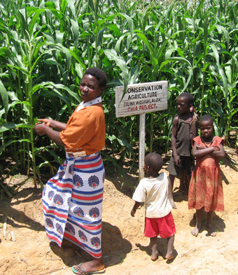Honest, paywall-free news is rare. Please support our boldly independent journalism with a donation of any size.
Paris – After weeks of rumours sparked by the leaking of a draft World Bank position paper on so-called land grabs in poor countries, the international financial institution has officially released its report on the surge in farmland purchases and leasing which have elicited controversy for over two years.
Acquisitions of vast tracts of fertile land in Africa by foreign governments and companies eager to secure affordable food resources in highly volatile commodity markets stirred public attention when the South Korean company Daewoo bought more than a million hectares of farmland in the east African island state Madagascar.
The World Bank report, titled “Rising Global Interest in Farmland. Can It Yield Sustainable and Equitable Benefits?” and released on Sep 8, cautions that “an astonishing lack of awareness of what is happening on the ground” exists — even by the public sector institutions mandated to control this phenomenon.
It estimates that 2009 saw 45 million hectares of farmland deals going through and predicts that, “given commodity price volatility, growing human and environmental pressures, and worries about food security, this interest will increase, especially in the developing world”.
At the beginning of Sep 2010, riots over steep increases in the price of bread left seven people dead and hundreds injured in Maputo, the capital of the southern African country Mozambique, sparking fears of another food crisis like the one that affected several African countries two years ago.
That same week, the United Nations’ Food and Agriculture Organisation announced that, “surging wheat prices drove international food prices up five percent (in Aug 2010) in the biggest month-on-month increase since November 2009.”
Several huge farmland investment deals have been decried for bringing uncertain benefits to recipient countries, and sometime for leading to smallholders’ eviction from their land and adversely affecting local livelihoods.
The World Bank report reckons that “one of the highest development priorities in the world must be to improve smallholder agricultural productivity, especially in Africa”.
But the report deems that “when done right, larger scale farming systems can also have a place as one of many tools to promote sustainable agricultural and rural development”. It then proceeds to detail many conditions for these deals to benefit developing countries.
Don’t miss a beat – get Truthout Daily Email Updates. Click here to sign up for free.
“When assisted, family farmers have been able to compete in global markets. Many companies have successfully collaborated with local farmers,” Lorenzo Cotula, who researches the topic for the London-based International Institute for Environment and Development, told IPS. The non-profit IIED promotes sustainable development.
“But national laws in recipient countries need to be changed and better implemented, so local people can have more secure rights to their land,” he cautions.
The report states that farmland investments’ adverse effects on local development are often due to the fact that host countries’ governments “were ill-equipped and ill-prepared to deal with the sudden influx of interest”.
Indeed, many such deals have been rushed through, and several have brought minimal revenue to public coffers. “The fact that there appears to be significant interest in countries with weak governance implies that the risks associated with such investments are immense,” the report warns.
Cotula concurs and adds: “Governments must be able to regulate investment and skilfully negotiate with investors. Civil society should be able to scrutinise government and investor action, and farmers’ groups should be able to negotiate with government and investors.
“International agencies can play an important role in making these three conditions come true,” he suggests.
The World Bank report calls for global implementation of investment principles it drafted last year with other developmental institutions such as FAO.
But it acknowledges that the “effectiveness of these rules depends on the mechanisms for disclosure and enforcement that are available to assess whether actors comply with standards, and to deal with cases where they do not”.
Such enforcements mechanisms do not yet exist, and some observers are sceptical.
“Relying on voluntary enforcement of such principles would never work as investors would pay no heed to them. Many already hide behind governments and shell companies”, says Antoine Bouhey, who leads the campaign for farmers’ rights in developing countries as organised by the nongovernmental organisation (NGO) Peuples Solidaires in association with international NGO ActionAid.
“What we need is constraining legislation, both in recipient countries and at home where the investing corporations are headquartered,” he argues.
“This will take a while. In the meantime a moratorium on these investments should be declared in developing countries that have not reached millennium development goal one (eradicating extreme poverty and hunger),” he adds.
While the World Bank report anticipates that demand for land may be increasing, it admonishes that, “at the same time, scarcity of information on what is happening encourages speculation on a large scale”.
But, in a hopeful conclusion, it observes that “these risks correspond to equally large opportunities”, as “increased productivity and effectiveness in the utilisation of (large areas of land currently not cultivated) could have far- reaching developmental impacts”.
Press freedom is under attack
As Trump cracks down on political speech, independent media is increasingly necessary.
Truthout produces reporting you won’t see in the mainstream: journalism from the frontlines of global conflict, interviews with grassroots movement leaders, high-quality legal analysis and more.
Our work is possible thanks to reader support. Help Truthout catalyze change and social justice — make a tax-deductible monthly or one-time donation today.
